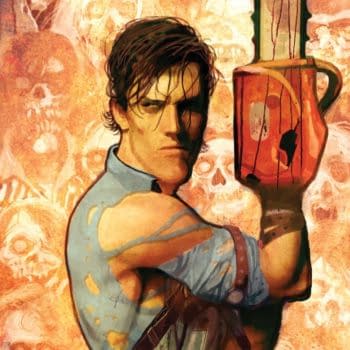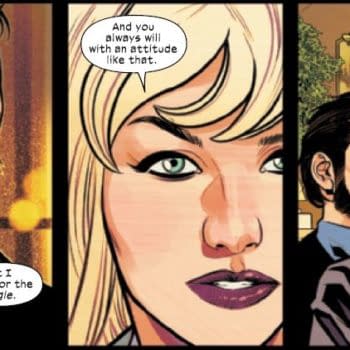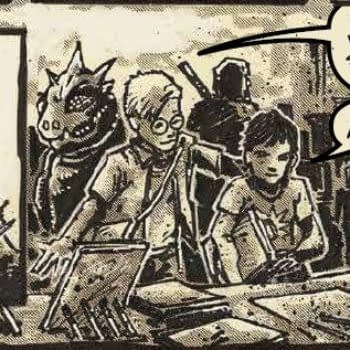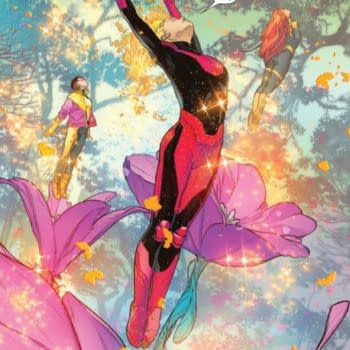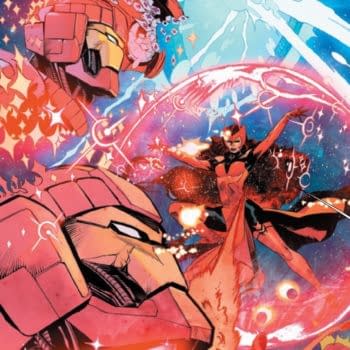Posted in: Comics, Recent Updates | Tagged: Alan Moore, Alec, Alec:The Years Have Pants, ales kot, Bacchus, Comics, eddie campbell, entertainment, from hell, kieron gillen, neil gaiman
Unsung Masterpieces #2: Alec, with Eddie Campbell
By David Dissanayake
Here we are for the second (somewhat delayed) installment of Unsung Masterpieces (You can check out our first installment, "Enigma, with Duncan Fegredo, Peter Milligan, and Art Young", here).
Warren Ellis once said that "American comics are hugely eager to put the future behind them." He's right. The nature of the comic shop is that old material has to, by necessity, be slowly removed to make space on the shelves for the constant flow of new books arriving week in, week out. Sometimes that can lead to important works fading out from our collective comics conscience. This column is aimed at lessening that pressure of perpetual newness (don't get me wrong, I love new books too) by looking back at some of the older, unjustly lesser-known high water marks of our medium.
This week's column will go in-depth into Eddie Campbell's Alec: The Years Have Pants omnibus collection, complete with an interview with Mr. Campbell himself.
Now, writing about Alec in a column like this is a difficult and scary thing. Alec is perhaps such an important work because not only utterly unique, but it's also so varied in content and tone. It isn't one thing, its many things, and that is why it's such an important, inspired and difficult to discuss work.
Just in case you don't take my word for it, here as some creators talking about the importance of Alec and the impact it had on them:
That anyone is asking for my opinion on Alec is something that makes me want to immediately say "Hell, no." I'm in no position to talk about Alec. It's the main body of work from one of comics most inspired and singular voices. Have you seen THE YEARS HAVE PANTS? Just look at it. Look at it, for fuck's sake. I'm intimidated just touching the thing. That said, Alec *has* been enormously influential, and the only reason that it hasn't been even *more* influential in comics is because what Campbell does is phenomenally difficult. I mean, it's the great unspoken influence on PHONOGRAM, and the main reason no-one notices it is we did such a crap job of lifting Alec's romanticism of life lived. On a personal level, ALEC: HOW TO BE AN ARTIST was one of those big hits around the head about comics of when I was getting into the medium, and I'd put it alongside HICKSVILLE in terms of things that infected me with that sort of frenzied comic-creator virus. Read it. Read it all. Get tattoos. Call your kids Alec. – Kieron Gillen
Through its focus on importance of each event, however seemingly miniscule or unimportant, ALEC helped me understand how to measure and value time — not just in comics, but in all aspects of my life. – Ales Kot
Do you need me to tell you how good Eddie Campbell is? Or that ALEC is probably the best book-length comic about art and wine and midlife crises and families and friends and wine and love and art and saying goodbye and terror there is? – Neil Gaiman
In the simplest of terms, Alec is Eddie Campbell's partial autobiography told over the course of almost 30 years (Alec is the name of the main character in the series; a graphic pseudonym for Eddie), but it's more accurate to call Alec a series of different autobiographies, released at different times, in different styles, and with different tones. Originally published in a variety of formats from a variety of different publishers, Alec began as a self-published book in the early 80's before becoming part of anthologies like Fast Fiction and Escape Magazine before moving again to subsequent publishers like Eclipse Comics, Fantagraphics, Dark Horse, First Second, and Top Shelf. The most recent omnibus edition, Alec: The Years Have Pants, has all of these separate works collected in a beautiful and affordable single volume.
Reading through the collected Alec is literally watching the growth and development of a person over the course of decades. You get to see Alec's personal ideologies shift and certainties once held dear fall by the wayside as age comes knocking, bringing with it new experiences, perspectives and necessities. Eddie said of Alec, "People are born, grow up and leave home in the course of these 640 pages."
Alec is a big book about small moments. The stories in Alec highlight those minute, often overlooked events that are so full of poetry and humanity; events whose true importance, when realized, resonate throughout the years of one's entire life. Eddie is peerless when it comes to his penchant for capturing the seemingly mundane little happenings that aren't quite as little as they seem.
Eddie moves from his younger life, romantically envisioning the world, his friends, the pub, and his place in the world, into stories focused on further into the creative journey and the frustration, poverty and mid-life crises that follow. Parts of Alec are explorations of Comics as Art, woven together with a firsthand account of what it was like in the UK comics community at the when comics like Maus and Watchmen started hitting the headlines. He shows us the inside perspective of becoming his own publisher, working with Alan Moore on From Hell and what it was like to see that story realized on the big screen, raising children, and finally ends on a perfectly symmetrical note of retrospection. Oh, and of course, there are the hundreds of other aspects in Alec as well, these are just a handful of the bigger ones.
Now, I wanted to put Alec back in the spotlight with this column because it's a book that changes you when you read it. It changed the way I thought about art, creativity, time, myself, and I suppose more broadly, what it is to be a human and how I experience my own life. As a twenty six year old, reading what an on-going process of autobiography, witnessing as Alec/Eddie went from around my age to the age he is now, exhibiting the changes in perspective and approach that I might find as I continue on my own journey, was nothing short of a mind-altering experience. It was both startling and helpful to gain that kind of perspective.
As a reader, it's hard not to see a self-reflection in Alec. Eddie's stories prompt you to think about the poetry and story in your own life. After finishing it, I was left in sheer awe at the skill with which Eddie succeeds in his quest to bring the most simple of truths into this work. Alec inspires, challenges, and entertains in a way only a masterpiece could.
I emailed back and forth with Eddie over the holidays to pick his brain on Alec. Here is out conversation:
David Dissanayake: To begin, let's start at the beginning! Tell us a little bit about the inception of Alec. At that time in your life what was it that attracted you to the idea of taking an autobiographical approach to capturing those early stories?
Eddie Campbell: I was trying to find something authentic. Every story I read seemed to be the same as some other story. I was trying to find something, no matter how insignificant or small, that was connected to actual experience. I never thought my own life was more interesting than anybody else's, but I could vouch for it being the real thing.
DD: That is exactly what struck me immediately when I first read Alec, those authentic experiential truths. With Alec you did an exceptional job in capturing incredibly poetic moments in the smallest of everyday experiences. I'm curious about your process for translating these onto the page. I'm sure it differed between books, but could you tell us what your process was? Would you keep a notebook on you to jot down moments in?
EC: Yes, I started noting things down every minute of the day. In the later books, like the Snooter, I drew things as they occurred to me, but with the King Canute Crowd and How to Be an Artist I kept long-running diaries. The notebook for the first Alec looked this. It was a pocket racing diary and I stapled in extra sheets of paper whenever my notations ran over the tiny space allowed. the booklet wound up being almost cylindrical.
DD: Going into Alec did you have an idea that you might be getting into a decades-long project? Was that part of the original impetus behind beginning Alec, to create a kind of long running artistic outlet to capture those particular moments of your life?
EC: No, I had no idea at the beginning that it would be a long-running thing. I don't think in my twenties I had a long range vision of what I was about. We have no idea of what it's like to not be in our twenties. But then, that's what makes the first book kind of interesting to look back on. It feels to me that it was written by some person other than myself. Most of the problems between generations in our society derive from how easily we forget our frame of mind in one phase after we've moved on to the next. Essentially that's the value in getting things down on paper with honesty.
DD: Those are some really interesting points. What was it like going reading through the early Alec works again as an older phase of Eddie Campbell looking back at younger phases? You touched upon it a bit in the final pages of The Years Have Pants, I know, but what else do you feel besides reviling the once romanticized notion of drunkenly adventuring into couches, floors, and sleeping bags? Have you even able to re-learn aspects of yourself that you've forgotten or rekindle old passions or creative flows from your younger self?
EC: Mostly I just want to thump that silly bastard, that youthful me. He was such an idiot. In fact there's a panel in After the Snooter in which I can't stop myself. I step out of my own time stream to punch my younger self in the back of the head. And then, in a peculiar time paradox, there is a later occasion in the story where I remember a strange feeling almost as though I had been thumped on the back of the head.
DD: Did you ever get into trouble with any of your friends or acquaintances that found their way into the Alec stories and ended up reading them later?
EC: No, never, but then I made sure I live on the other side of the world from my youthful adventures.
DD: Tell us a little bit about your use of the 9 panel grid in Alec. I've heard you talk a little bit in other interviews about the different kinds of pictorial syntaxes that govern comics- those gravitational laws that shape the particular comics idiom they are a part of- and I was wondering to what extent your thoughts on those influenced the Alec page layouts?
EC: Formally I've always been more interested in making patterns over an extended time than in playing with layout, which I regard as gimmicky. So at the beginning I asked what would be the smallest number of panels on a page that you would need. A single repetition is coincidence, but a second repetition, meaning three units, is intentional. So my basic design needed to be three by three. I'm sure Alan and Dave applied the same logic when they did it on Watchmen.
DD: How did you choose what to include or exclude in each book? I know each one has a bit of a different theme and took place during different phases of your life, but out of that whole mass of material you noted down and collected, how did you go about choosing what to include/exclude in the books?
EC: The finished statue always weighs much less than the big hunk of marble they mine out the hillside. Getting the material into a manageable and simple sequence always involves throwing out the larger part. (The big hunk I showed earlier was just for the King Canute Crowd— all the other books had their own source notes)
DD: I thought it was interesting that a lot of big life moments, your wedding, the birth of your children, etc. weren't directly touched upon in Alec. It's obvious that they happened, of course, but I was wondering if you could talk a little bit about why you decided to leave those out?
EC: It's all about storytelling. If I didn't have a story to tell about it I didn't bring it up. Children can be very funny, but not when they've just been born.
DD: Looking back on your creative life, what were some of the defining influences on your artistic outlook and drive- writers, artists, teachers, friends, family, or anything else? When you look back, who are the creators/what are the works that left an indelible mark of inspiration on you?
EC: "Looking back on my creative life" makes it sound like it's finished. Certainly not. But this kind of question always seems to me to be less and less relevant as I get older. The people who inspired or influenced me at the beginning now appear small and distant. I guess there's one artist that interests me as much today as the day I first saw his work. That's Tad Dorgan.
DD: So, we've heard a little bit about your next work with Neil Gaiman as well as teases about a Bacchus omnibus. What can you tell us about these forthcoming releases? Beyond these two, what else tempts you on the creative horizon?
EC: I provided the pictures for a live event that Neil [Gaiman] made at the Sydney Opera House a couple of years back. And now we've turned it into a book. That should be out in the middle of next year. We plan to restage the event in a few places. That's Neil reading, my pictures and the accompanying music of a string quartet named Fourplay. They're a kind of rock'n'roll string quartet.
DD: And as for Bacchus?
EC: Still on the schedule. Sooner or later!
There it is folks, Alec and Eddie Campbell. If you haven't read it, obviously I highly recommend that you walk down to your LCS and buy a copy immediately, and if you have read it, rereading Alec will only rekindle your love for it.
David Dissanayake is Senior Washington D.C. Correspondent at Bleeding Cool Give him a shout on Twitter @dwdissanayake

















